[Ministry of Foreign Affairs of Japan] [Wednesday, Apr 29, 2015]
"Toward an Alliance of Hope" - Address to a Joint Meeting of the U.S. Congress by Prime Minister Shinzo Abe
Mr. Speaker, Mr. Vice President, distinguished members of the Senate and the House, distinguished guests, ladies and gentlemen,
Back in June, 1957, Nobusuke Kishi, my grandfather, standing right here, as Prime Minister of Japan, began his address, by saying, and I quote,
"It is because of our strong belief in democratic principles and ideals that Japan associates herself with the free nations of the world."
58 years have passed. Today, I am honored to stand here as the first Japanese Prime Minister ever to address your joint meeting. I extend my heartfelt gratitude to you for inviting me.
I have lots of things to tell you. But I am here with no ability, nor the intention, ....to filibuster.
As I stand in front of you today, the names of your distinguished colleagues that Japan welcomed as your ambassadors come back to me: the honorable Mike Mansfield, Walter Mondale, Tom Foley, and Howard Baker.
On behalf of the Japanese people, thank you so very much for sending us such shining champions of democracy.
Ambassador Caroline Kennedy also embodies the tradition of American democracy. Thank you so much, Ambassador Kennedy, for all the dynamic work you have done for all of us.
We all miss Senator Daniel Inouye, who symbolized the honor and achievements of Japanese-Americans.
America and I
Ladies and gentlemen, my first encounter with America goes back to my days as a student, when I spent a spell in California.
A lady named Catherine Del Francia let me live in her house.
She was a widow, and always spoke of her late husband saying, “You know, he was much more handsome than Gary Cooper.” She meant it. She really did.
In the gallery, you see, my wife, Akie, is there. I don't dare ask what she says about me.
Mrs. Del Francia’s Italian cooking was simply out of this world. She was cheerful, and so kind, as to let lots and lots of people stop by at her house.
They were so diverse. I was amazed and said to myself,"America is an awesome country."
Later, I took a job at a steelmaker, and I was given the chance to work in New York.
Here in the U.S. rank and hierarchy are neither here nor there. People advance based on merit. When you discuss things you don’t pay much attention to who is junior or senior. You just choose the best idea, no matter who the idea was from.
This culture intoxicated me.
So much so, after I got elected as a member of the House, some of the old guard in my party would say, "hey, you’re so cheeky, Abe."
American Democracy and Japan
As for my family name, it is not “Eighb.”
Some Americans do call me that every now and then, but I don’t take offense.
That's because, ladies and gentlemen, the Japanese, ever since they started modernization, have seen the very foundation for democracy in that famous line in the Gettysburg Address.
The son of a farmer-carpenter can become the President... The fact that such a country existed woke up the Japanese of the late 19th century to democracy.
For Japan, our encounter with America was also our encounter with democracy. And that was more than 150 years ago, giving us a mature history together.
World War II Memorial
Before coming over here, I was at the World War II Memorial. It was a place of peace and calm that struck me as a sanctuary. The air was filled with the sound of water breaking in the fountains.
In one corner stands the Freedom Wall. More than 4,000 gold stars shine on the wall.
I gasped with surprise to hear that each star represents the lives of 100 fallen soldiers.
I believe those gold stars are a proud symbol of the sacrifices in defending freedom. But in those gold stars, we also find the pain, sorrow, and love for family of young Americans who otherwise would have lived happy lives.
Pearl Harbor, Bataan Corregidor, Coral Sea.... The battles engraved at the Memorial crossed my mind, and I reflected upon the lost dreams and lost futures of those young Americans.
History is harsh. What is done cannot be undone.
With deep repentance in my heart, I stood there in silent prayers for some time.
My dear friends, on behalf of Japan and the Japanese people, I offer with profound respect my eternal condolences to the souls of all American people that were lost during World War II.
Late Enemy, Present Friend
Ladies and gentlemen, in the gallery today is Lt. Gen. Lawrence Snowden.
Seventy years ago in February, he landed on Iōtō, or the island of Iwo Jima, as a captain in command of a company.
In recent years, General Snowden has often participated in the memorial services held jointly by Japan and the U.S. on Iōtō.
He said, and I quote, “We didn’t and don’t go to Iwo Jima to celebrate victory, but for the solemn purpose to pay tribute to and honor those who lost their lives on both sides.”
Next to General. Snowden sits Diet Member Yoshitaka Shindo, who is a former member of my Cabinet. His grandfather, General Tadamichi Kuribayashi, whose valor we remember even today, was the commander of the Japanese garrison during the Battle of Iwo Jima.
What should we call this, if not a miracle of history?
Enemies that had fought each other so fiercely have become friends bonded in spirit.
To General Snowden, I say that I pay tribute to your efforts for reconciliation. Thank you so very much.
America and Post-War Japan
Post war, we started out on our path bearing in mind feelings of deep remorse over the war. Our actions brought suffering to the peoples in Asian countries. We must not avert our eyes from that. I will uphold the views expressed by the previous prime ministers in this regard.
We must all the more contribute in every respect to the development of Asia. We must spare no effort in working for the peace and prosperity of the region.
Reminding ourselves of all that, we have come all this way. I am proud of this path we have taken.
70 years ago, Japan had been reduced to ashes.
Then came each and every month from the citizens of the United States gifts to Japan like milk for our children and warm sweaters, and even goats. Yes, from America, 2,036 goats came to Japan.
And it was Japan that received the biggest benefit from the very beginning by the post-war economic system that the U.S. had fostered by opening up its own market and calling for a liberal world economy.
Later on, from the 1980’s, we saw the rise of the Republic of Korea, Taiwan, the ASEAN countries, and before long, China as well.
This time, Japan too devotedly poured in capital and technologies to support their growths.
Meanwhile in the U.S., Japan created more employment than any other foreign nation but one, coming second only to the U.K.
TPP
In this way, prosperity was fostered first by the U.S., and second by Japan. And prosperity is nothing less than the seedbed for peace.
Involving countries in Asia-Pacific whose backgrounds vary, the U.S. and Japan must take the lead. We must take the lead to build a market that is fair, dynamic, sustainable, and is also free from the arbitrary intentions of any nation.
In the Pacific market, we cannot overlook sweat shops or burdens on the environment. Nor can we simply allow free riders on intellectual property.
No. Instead, we can spread our shared values around the world and have them take root: the rule of law, democracy, and freedom.
That is exactly what the TPP is all about.
Furthermore, the TPP goes far beyond just economic benefits. It is also about our security. Long-term, its strategic value is awesome. We should never forget that.
The TPP covers an area that accounts for 40 per cent of the world economy, and one third of global trade. We must turn the area into a region for lasting peace and prosperity.
That is for the sake of our children and our children's children.
As for U.S. - Japan negotiations, the goal is near. Let us bring the TPP to a successful conclusion through our joint leadership.
Reforms for a Stronger Japan
As a matter of fact, I have something I can tell you now.
It was about 20 years ago. The GATT negotiations for agriculture were going on.
I was much younger, and like a ball of fire, and opposed to opening Japan's agricultural market. I even joined farmers' representatives in a rally in front of the Parliament.
However, Japan’s agriculture has gone into decline over these last 20 years. The average age of our farmers has gone up by 10 years and is now more than 66 years old.
Japan's agriculture is at a crossroads. In order for it to survive, it has to change now.
We are bringing great reforms toward the agriculture policy that's been in place for decades. We are also bringing sweeping reforms to our agricultural cooperatives that have not changed in 60 long years.
Corporate governance in Japan is now fully in line with global standards, because we made it stronger.
Rock-solid regulations are being broken in such sectors as medicine and energy. And I am the spearhead.
To turn around our depopulation, I am determined to do whatever it takes. We are changing some of our old habits to empower women so they can get more actively engaged in all walks of life.
In short, Japan is right in the middle of a quantum leap.
My dear members of the Congress, please do come and see the new Japan, where we have regained our spirit of reform and our sense of speed.
Japan will not run away from any reforms. We keep our eyes only on the road ahead and push forward with structural reforms.
That's TINA: There Is No Alternative. And there is no doubt about it whatsoever.
Post War Peace and Japan's Choice
My dear colleagues, the peace and security of the post-war world was not possible without American leadership.
Looking back, it makes me happy all the time that Japan of years past made the right decision.
As I told you at the outset, citing my grandfather, that decision was to choose a path.
That's the path for Japan to ally itself with the U.S., and to go forward as a member of the Western world.
In the end, together with the U.S. and other like-minded democracies, we won the Cold War.
That's the path that made Japan grow and prosper. And even today, there is no alternative.
The Alliance: its Mission for the Region
My dear colleagues, we support the “rebalancing” by the U.S. in order to enhance the peace and security of the Asia-Pacific region.
And I will state clearly. We will support the U.S. effort first, last, and throughout.
Japan has deepened its strategic relations with Australia and India. We are enhancing our cooperation across many fields with the countries of ASEAN and the Republic of Korea.
Adding those partners to the central pillar that is the U.S.-Japan alliance, our region will get stable remarkably more.
Now, Japan will provide up to 2.8 billion dollars in assistance to help improve U.S. bases in Guam, which will gain strategic significance even more in the future.
As regards the state of Asian waters, let me underscore here my three principles.
First, states shall make their claims based on international law.
Second, they shall not use force or coercion to drive their claims.
And third, to settle disputes, any disputes, they shall do so by peaceful means.
We must make the vast seas stretching from the Pacific to the Indian Oceans seas of peace and freedom, where all follow the rule of law.
For that very reason we must fortify the U.S.-Japan alliance. That is our responsibility.
Now, let me tell you.
In Japan we are working hard to enhance the legislative foundations for our security.
Once in place, Japan will be much more able to provide a seamless response for all levels of crisis.
These enhanced legislative foundations should make the cooperation between the U.S. military and Japan's Self Defense Forces even stronger, and the alliance still more solid, providing credible deterrence for the peace in the region.
This reform is the first of its kind and a sweeping one in our post-war history. We will achieve this by this coming summer.
Now, I have something to share with you.
The day before yesterday Secretaries Kerry and Carter met our Foreign Minister Kishida and Defense Minister Nakatani for consultations.
As a result, we now have a new framework. A framework to better put together the forces of the U.S. and Japan.
A framework that is in line with the legislative attempts going on in Japan.
That is what's necessary to build peace, more reliable peace in the region. And that is namely the new Defense Cooperation Guidelines.
Yesterday, President Obama and I fully agreed on the significance of these Guidelines.
Ladies and gentlemen, we agreed on a document that is historic.
Japan's New Banner
In the early 1990s, in the Persian Gulf Japan's Self-Defense Forces swept away sea mines.
For 10 years in the Indian Ocean, Japanese Self-Defense Forces supported your operation to stop the flow of terrorists and arms.
Meanwhile in Cambodia, the Golan Heights, Iraq, Haiti, and South Sudan, members of our Self-Defense Forces provided humanitarian support and peace keeping operations. Their number amounts to 50,000.
Based on this track record, we are resolved to take yet more responsibility for the peace and stability in the world.
It is for that purpose we are determined to enact all necessary bills by this coming summer. And we will do exactly that.
We must make sure human security will be preserved in addition to national security. That's our belief, firm and solid.
We must do our best so that every individual gets education, medical support, and an opportunity to rise to be self-reliant.
Armed conflicts have always made women suffer the most. In our age, we must realize the kind of world where finally women are free from human rights abuses.
Our servicemen and women have made substantial accomplishments. So have our aid workers who have worked so steadily.
Their combined sum has given us a new self-identity.
That's why we now hold up high a new banner that is "proactive contribution to peace based on the principle of international cooperation."
Let me repeat. "Proactive contribution to peace based on the principle of international cooperation" should lead Japan along its road for the future.
Problems we face include terrorism, infectious diseases, natural disasters and climate change.
The time has come for the U.S.-Japan alliance to face up to and jointly tackle those challenges that are new.
After all our alliance has lasted more than a quarter of the entire history of the United States.
It is an alliance that is sturdy, bound in trust and friendship, deep between us.
No new concept should ever be necessary for the alliance that connects us, the biggest and the second biggest democratic powers in the free world, in working together.
Always, it is an alliance that cherishes our shared values of the rule of law, respect for human rights and freedom.
Hope for the future
When I was young in high school and listened to the radio, there was a song that flew out and shook my heart.
It was a song by Carol King.
“When you're down and troubled, ...close your eyes and think of me, and I'll be there to brighten up even your darkest night.”
And that day, March 11, 2011, a big quake, a tsunami, and a nuclear accident hit the northeastern part of Japan.
The darkest night fell upon Japan.
But it was then we saw the U.S. armed forces rushing to Japan to the rescue at a scale never seen or heard before.
Lots and lots of people from all corners of the U.S. extended the hand of assistance to the children in the disaster areas.
Yes, we've got a friend in you.
Together with the victims you shed tears. You gave us something, something very, very precious.
That was hope, hope for the future.
Ladies and gentlemen, the finest asset the U.S. has to give to the world was hope, is hope, will be, and must always be hope.
Distinguished representatives of the citizens of the United States, let us call the U.S.-Japan alliance, an alliance of hope.
Let the two of us, America and Japan, join our hands together and do our best to make the world a better, a much better, place to live.
Alliance of hope.... Together, we can make a difference.
Thank you so much.
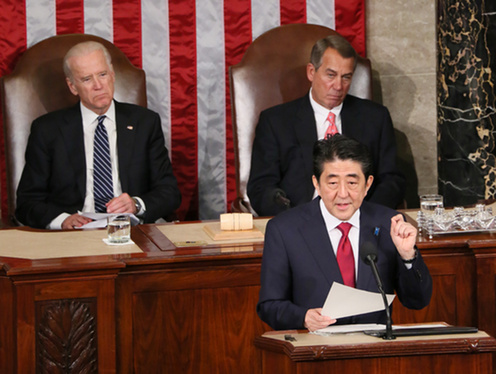
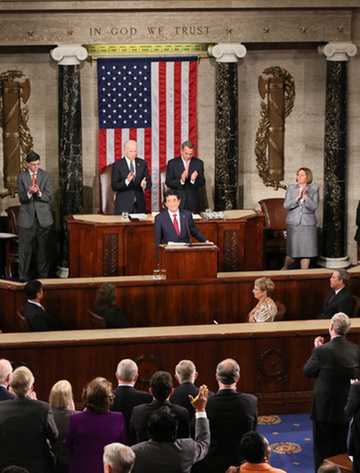
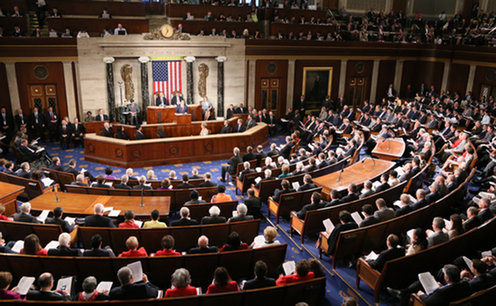
[Ministry of Foreign Affairs of Japan] [Tuesday, Apr 28, 2015]
Japan-U.S. Security Consultative Committee (“2+2” Ministerial Meeting)
In the morning of April 27, 2015 EST, the Security Consultative Committee (SCC) (the “2+2” Ministerial Meeting) was convened in New York City.
The Meeting was attended by Minister for Foreign Affairs, Mr. Fumio Kishida and Minister of Defense, Mr. Gen Nakatani from the Japanese side and Secretary of State, Honorable John F. Kerry and Secretary of Defense, Honorable Ashton Carter from the U.S. side. The Meeting was the first to have been convened since October 3, 2013.
In the Meeting, given a much closer Japan-U.S. relationship which the two countries have enjoyed in recent years, the Ministers had discussions over a range of topics including bilateral security and defense cooperation as well as the realignment of U.S. Forces in Japan. The SCC approved the new Guidelines for Japan-U.S. Defense Cooperation (and issued the Joint Statement (PDF).) Open a New Windowand issued the Joint Statement (http://www.mofa.go.jp/files/000078186.pdf).
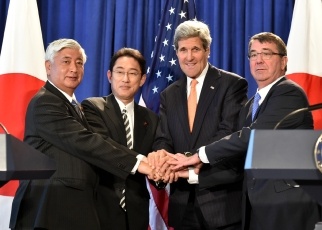
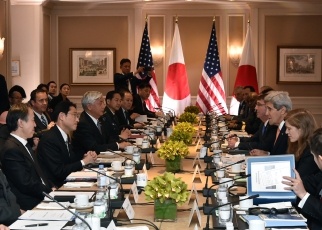
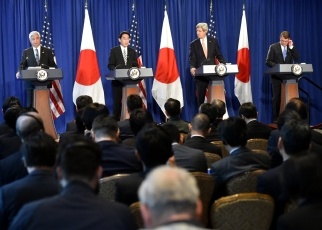
[ Ministry of Foreign Affairs of Japan] [Tuesday, Apr 28, 2015]
Japan-U.S. Foreign Ministers’ Meeting
In the morning of April 27 (EST), Mr. Fumio Kishida, Minister for Foreign Affairs of Japan, had a short meeting with Honorable John F. Kerry, Secretary of State of the United States in New York City. The overview of the meeting is as follows.
1. Minister Kishida welcomed the recent advancement of the U.S. - Cuba relationship and expressed his intention to lend support to the effort by the two countries by referring to his planned visit to Cuba in a few days. Secretary Kerry welcomed Minister Kishida’s initiative in this regard.
2. With regard to the nuclear issue on Iran, bearing in mind their respective planned meetings with Dr. Mohammad Javad Zarif, Foreign Minister of Iran, Minister Kishida and Secretary Kerry concurred with the importance of ensuring Iran’s use of nuclear energy is peaceful. Secretary Kerry commented that Japan’s experience in peaceful use of nuclear energy should be learned.
[Ministry of Foreign Affairs of Japan] [Tuesday, Apr 28, 2015]
Foreign Minister Fumio Kishida Meets with the Director General of the International Atomic Energy Agency
On Monday, April 27, commencing at 5:05 p.m. (Tuesday, April 28, 6:05 a.m., Japan time) for approximately 10 minutes, Mr. Fumio Kishida, Minister for Foreign Affairs, who is visiting New York, held a meeting with Mr. Yukiya Amano, Director General of the International Atomic Energy Agency (IAEA). The overview is as follows.
1. Minister Kishida stated that if a final agreement is reached on the Iranian nuclear issue, the IAEA will perform an important role in verifying the implementation of the terms of the agreement, and Japan will support the IAEA's efforts. Director General Amano stated that the IAEA would like to cooperate with Japan.
2. Additionally, Minister Kishida mentioned that at the 2015 NPT Review Conference, Japan had pledged a contribution of 25 million U.S. dollars over a five-year period to the IAEA's Peaceful Uses Initiative (PUI), and Director General Amano expressed his gratitude.
3. In addition, Minister Kishida and Director General Amano exchanged views on the overall relationship of cooperation between Japan and the IAEA, and confirmed that Japan and the IAEA will further strengthen their cooperation.
(Reference): The International Atomic Energy Agency (IAEA)
・The IAEA is an international organization that was set up in 1957 based on the IAEA charter with the goal of promoting the peaceful use of nuclear power, and to that end, preventing the diversion of nuclear power for military purposes and ensuring nuclear power safety. (It currently has 164 member states). Validation to ensure that nuclear material etc. is not utilized in ways likely to contribute to military purposes is implemented based on safeguard agreements and additional protocols with member states.
・In order to strengthen the international nuclear non-proliferation framework by having more countries conclude these safeguard agreements and additional protocols, Japan is cooperating with the IAEA to lobby and support the countries concerned.
・Director General Amano was appointed as Director General in December 2009, and reappointed in December 2013.
[Ministry of Foreign Affairs of Japan] [Monday, Apr 27, 2015]
Emergency Assistance to Nepal in Response to the Earthquake
1. On Sunday, April 26, the Government of Japan decided to provide emergency relief goods worth 25 million yen (Tents, blankets etc.) to Nepal, through the Japan International Cooperation Agency (JICA) in response to the request from the Government of Nepal following the damage caused by the massive earthquake.
2. A wide range of area including Kathmandu has been affected. According to the announcement of the Government of Nepal (Local time on April 26, 12:00), 1905 people were dead from the massive earthquake.
3. The Government of Japan decided to provide emergency assistance from the humanitarian point of view for the victims as well as in light of the friendly relationship between Japan and Nepal.
[Ministry of Foreign Affairs of Japan] [Thursday, May 28, 2015]
Dispatch of Japan Disaster Relief (JDR) Team (Japan Self-Defense Force Units) in Response to the Earthquake Damage in Nepal
1. On Monday, April 27, in response to the request from the Government of Nepal, the Government of Japan decided to dispatch the Japan Self-Defense Force Units as a Japan Disaster Relief (JDR) Team to Nepal considering the immense damage caused by the earthquake.
2. The first team (approximately 20 members in total) is scheduled to leave for Kathmandu on Tuesday, April 28.
3. The SDF members are expected to conduct activities including medical assistance in Nepal and will begin assistance operations in earliest possible time after arrival, while assessing the conditions of the affected area.